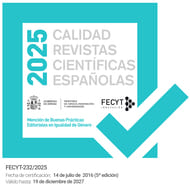Aprendizaje de francés a través de videojuegos cooperativos: /Portal 2/
Resumen
Partimos de una experiencia didáctica centrada en el uso del videojuego cooperativo Portal 2 y hemos descrito la experiencia de nuestro alumnado en cuanto al aprendizaje de FLE a través de un cuestionario de elaboración propia. En él se han analizado las diferencias estadísticas significativas siguiendo un método descriptivo y cuantitativo. Los resultados consideran las 4 dimensiones obtenidas en el análisis factorial exploratorio y se presentan las relaciones entre los 4 factores, así como el establecimiento de un modelo predictor de la valoración de la experiencia. Las conclusiones nos llevan a afirmar que la incorporación de un videojuego cooperativo y la inclusión de sesiones didácticas ha llevado a una consideración bastante positiva del alumnado con respecto a la dinámica planteada.
Citas
BADO, Niamboue & Teresa FRANKLIN (2014): «Cooperative Game-based Learning in the English as a Foreign Language Classroom». Issues and Trends in Educational Tech-nology, 2: 2. DOI: https://doi.org/10.2458/azu_itet_v2i2_bado
BARR, Matthew (2017): «Video games can develop graduate skills in higher education students: A randomised trial». Computers & Education, 113, 86–97. DOI: https://doi.¬org/10.1016/j.compedu.2017.05.016
BRAZO-MILLÁN, Ana Isabel (2020): «El videojuego en la enseñanza de FLE: se puede aprender francés mediante videojuegos», in Natividad Aguayo Arrabal (ed.), Edu-cación de las Segundas Lenguas. Córdoba, UCOPress, 69-73.
BRAZO-MILLÁN, Ana Isabel; Juan Manuel MUÑOZ GONZÁLEZ & Carmen CASTRO DE CASTRO (2018): «Aprendiendo léxico y ortografía francesa en la universidad me-diante el videojuego Scribblenauts». EDMETIC, Revista de Educación Mediática y TIC, 7: 2, 18-36. DOI: https://doi.org/10.21071/edmetic.v7i2.7201
CASAÑ-PITARCH, Ricardo (2017): «Storyline-Based Videogames in the FL Classroom». Digital education, 37, 80-92.
CHIONG, Raymond & Jelena JOVANOVIC (2012): «Collaborative learning in online study groups: An evolutionary». Journal of Information Technology Education: Re-search, 11: 1, 81-101. URL: https://www.learntechlib.org/p/111494
CONSEJO DE EUROPA (2002). Marco Común Europeo de Referencia para las Lenguas: aprendizaje, enseñanza, evaluación. Madrid, Ministerio de Educación, Cultura y Deporte.
CREIGHTON, Susan & Andrea SZYMKOWIAK (2014): «The Effects of Cooperative and Competitive Games on Classroom Interaction Frequencies». Procedia – Social and Be¬havioral Sciences, 140, 155-163.
DAYOUB, Dima (2019): «Vernacular Digital Games as English Language Learning Tools: An Exploratory Study in the Syrian Context». Tishreen University Journal for Re-search and Scientific Studies - Arts and Humanities Series, 41: 2. 791-804.
DE CASTRO CASTRO, Carmen; Juan Manuel MUÑOZ GONZÁLEZ, & Ana Isabel BRAZO-MILLÁN (2018): «El uso de videojuegos serios en el aprendizaje de francés en educación superior». Revista Mexicana de Investigación Educativa, 23: 76. 157-177.
DE HAAN, Jonathan (2011): «Teaching and learning English through digital game pro-jects». Digital Culture & Education, 3: 1, 46-55.
DICKEY, Michelle (2011): «Murder on Grimm Isle: The impact of game narrative design in an educational gamebased learning environment». British Journal of Education-al Technology, 42: 3, 456-469.
EBRAHIMZADEH, Mohsen & Sepideh ALAVI (2017): «The effect of digital video games on EFL students’ language learning motivation». Teaching English with Technology, 17: 2, 87-112.
HIGGINS, Steven; Zhimin XIAO & Maria KATSIPATAKI (2012): The impact of digital tech-nology on learning: A summary for the education endowment foundation. Full Report. Durham, Durham University.
KESSLER, Carolyn [ed.]. (1992): Cooperative Language Learning: A Teacher’s Resource Book. Englewood Cliffs, NJ, Prentice Hall Regents.
KINZIE, Mable & Dolly JOSEPH (2008): «Gender differences in game activity preferences of middle school children: implications for educational game design». Educational Technology Research and Development, 56: 5-6, 643-663. DOI: https://doi.org/-10.1007¬/s11423-007-9076-z
KLIMOVA, Blanka & Jaroslav KACET (2017): «Efficacy of Computer Games on Language Learning». Turkish Online Journal of Educational Technology - TOJET, 16: 4, 19-26.
LORENZO-SEVA, Urbano (2000): «The weighted oblimin rotation». Psychometrika, 65, 301-318.
MATEO, Juan (2012): «La investigación ex post-facto», in Rafael Bisquerra (coord.). Meto-dología de investigación educativa, Madrid, La Muralla, 195-229.
MERINO-SOTO, César (2016): «Diferencias entre coeficientes alfa de Cronbach, con muestras y partes pequeñas: Un programa VB». Anales de Psicología, 32: 2, 587-588.
MUÑOZ GONZÁLEZ, Juan Manuel; Sebastián RUBIO GARCÍA & Ivanovnna M. CRUZ PI-CHARDO (2015): «Strategies of collaborative work in the classroom through the design of video games». Digital Education Review, 27, 69-84.
O'DOWD, Robert (2019): «Evaluating the impact of telecollaborative exchange in uni-versity education». Alsic, 22: 1. DOI: https://doi.org/10.14705/rpnet.2018.jve.1
OLLIVIER, Christian (2014): «Vers une approche interactionnelle en didactique des langues et une extension du domaine de la tâche – Les atouts du web 2.0». Alsic, 17. DOI: https://doi.org/10.4000/alsic.2743
OTZEN, Tamara & Carlos MANTEROLA (2017): «Técnicas de muestreo sobre una pobla-ción a estudio». International Journal of Morphology, 35: 1, 227-232. DOI: http://dx.doi.¬org/10.4067/S0717-95022017000100037
PARDO, Antonio & Miguel Ángel RUÍZ (2002). SPSS 11: Guía para el análisis de datos. Madrid, Mcgraw-Hill.
ROSAS, Ricardo, Miguel NUSSBAUM, Patricio CUMSILLE, Vladimir MARIANOV, Mónica CORREA, Patricia FLORES, … & Marcela SALINAS (2003): «Beyond Nintendo: Design and assessment of educational video games for first and second grade stu-dents». Computers & Education, 40: 1, 71-94.
SCHMOLL, Laurence (2017): «Penser l’intégration du jeu vidéo en classe de langue». Recherche et pratiques pédagogiques en langues de spécialité, 36 : 2. DOI: https://doi.org/¬10.4000/apliut.5722
THORNE, Steven, Rebecca BLACK & Julie SYKES (2009): «Second language use, socializa-tion, and learning in Internet interest communities and online gaming». The Modern Language Journal, 93, 802-821.
TIMMERMAN, Marieke E. & Urbano LORENZO-SEVA (2011): «Dimensionality Assess-ment of Ordered Polytomous Items with Parallel Analysis». Psychological Methods, 16: 2, 209-220.










